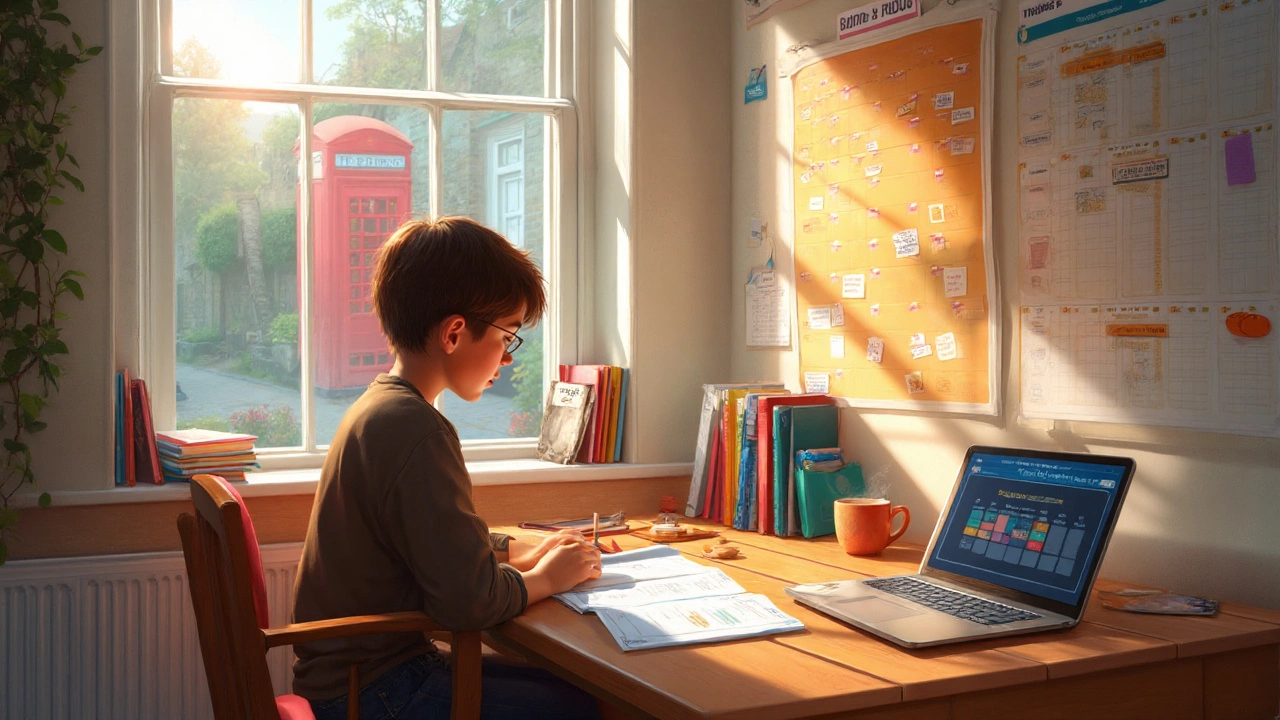Revision Timetable Builder
GCSE revision is a structured review process that helps students consolidate knowledge and improve performance in their General Certificate of Secondary Education exams. It isn’t just rereading notes; it’s a blend of scheduling, active learning, and self‑testing that turns short‑term memorisation into long‑term confidence.
Why GCSE Revision Matters
Research from the UK Department for Education shows that students who follow a systematic revision plan score on average 12% higher than peers who study haphazardly. The reason is simple: the brain needs repeated exposure, spaced over time, to move facts from working memory into long‑term storage. Without a plan, effort becomes chaotic, stress spikes, and performance suffers.
Key Components of an Effective Revision Routine
- Revision timetable: a visual calendar that allocates specific subjects and techniques to each study block.
- Past papers: authentic exam questions that let you practice timing and question‑style familiarity.
- Active recall: testing yourself on material rather than passively rereading.
- Spaced repetition: revisiting concepts at increasing intervals to cement memory.
- Revision guide: concise textbook or online resource that summarises each syllabus point.
- Mock exam: a full‑length practice test that mimics exam conditions.
Building Your Revision Timetable
Start by listing all GCSE subjects you’ll sit. Assign each a colour on a calendar - for example, blue for Maths, green for English, red for Science. Then allocate 45‑minute blocks, inserting short 5‑minute breaks to prevent fatigue. A typical weekly pattern might look like:
- Monday: Maths (active recall), English (past papers)
- Tuesday: Science (spaced repetition), History (revision guide)
- Wednesday: Geography (mind‑maps), French (flashcards)
- Thursday: Maths (mock exam), Art (review notes)
- Friday: English (essay practice), Computer Science (coding drills)
Notice the alternation of subjects - it reduces mental overload and keeps motivation high.
Choosing and Using Past Papers
The past papers you’ll download from exam boards like AQA, Edexcel, or OCR should match the specification of your specific exam. Mark the paper with a timer, then attempt it under exam conditions. Afterward, compare your answers with the mark scheme, noting any recurring weak spots. This data drives the next week’s timetable, focusing extra time on those topics.
Active Recall vs. Passive Review
Passive review - simply reading notes - yields a low retention rate (about 5%). Active recall flips the script: you close the book and write down everything you remember, or use flashcards to test yourself. The effort of retrieving information strengthens neural pathways.
| Technique | Key Benefit | Typical Session Length |
|---|---|---|
| Active Recall | Boosts retrieval strength | 10‑15min per topic |
| Spaced Repetition | Long‑term retention | 5‑10min daily |
| Passive Review | Quick overview | 20‑30min per chapter |
Notice how both active recall and spaced repetition require short, focused bursts - this aligns with research on attention spans for teenagers.

Leveraging Digital Tools
Apps like Quizlet and Anki implement spaced repetition automatically. Create a deck for each subject, tag cards by syllabus code, and let the algorithm schedule reviews. For visual learners, tools such as Lucidchart help build mind‑maps that summarise history timelines or biology processes.
Integrating Mock Exams
Schedule a full mock every two weeks in the run‑up to the real exam. Treat it as the actual test: no phone, timed, quiet environment. After each mock, review the mark sheet, tally the percentage of questions answered correctly, and pinpoint the top three error types (e.g., misreading the question, calculation slips, vague argument). Feed this insight back into your timetable.
Support Systems: Teachers, Parents, Peers
Teacher feedback is a gold mine. After a mock, ask your instructor to highlight where you lost marks and suggest targeted practice. Parents can help by providing a quiet study space and regular snack breaks to keep blood sugar stable. Peer study groups work best when each member prepares a short “teach‑back” segment - you learn by explaining concepts to others.
Common Pitfalls and How to Avoid Them
- Over‑loading one subject. Spread study time evenly; use the timetable to visualise balance.
- Last‑minute cramming. Start revision at least six weeks before exams to allow spaced repetition cycles.
- Skipping past papers. They are the single most predictive indicator of exam success.
- Ignoring well‑being. Sleep, exercise, and breaks are essential; a tired brain retains less.
Next Steps in the GCSE Revision Journey
Now that you understand what GCSE revision is and how each component fits together, the logical next topics are:
- "How to Create a Personalised Revision Guide" - deep‑dive into summarising textbooks.
- "Effective Use of Mind‑Maps for History and Geography" - visual learning techniques.
- "Balancing GCSE Revision with Extracurricular Activities" - time‑management strategies.
Pick one, set a mini‑goal for the week, and watch your confidence grow.
Frequently Asked Questions
What is the ideal length for a revision session?
Research suggests 45‑60 minutes is optimal for focus, followed by a 5‑10‑minute break. Shorter bursts work well for active recall, while longer slots suit mock exams.
How many past papers should I attempt?
Aim for at least one full paper per subject every two weeks. This provides enough practice to spot patterns without burning out.
Can digital flashcards replace traditional note‑taking?
Digital flashcards are great for memorising facts, but they complement rather than replace notes. Use notes for deep understanding and flashcards for quick recall.
What role does sleep play in revision?
Sleep consolidates memory. Aim for 8‑9 hours per night; a study by the University of Oxford found that students who slept after learning retained 30% more information.
How can I stay motivated during long revision periods?
Set micro‑goals (e.g., finish a chapter), reward yourself with short breaks, track progress on a visual chart, and regularly remind yourself of the final goal - better grades and future options.

